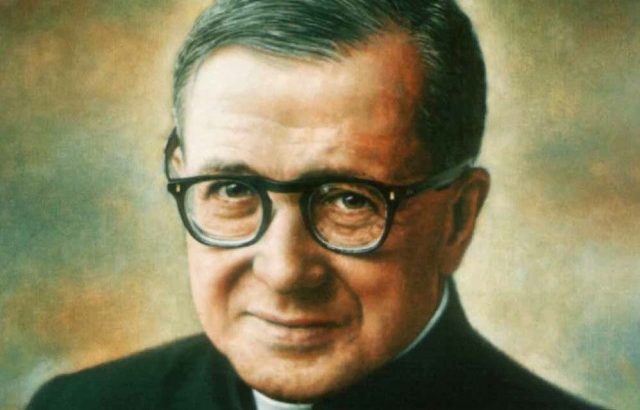State Papers: Echoes of the past from the archives
On the 26 July 1975, Msgr Josemaría Escrivá de Balaguer y Albás, Marquis of Peralta, the founder of Opus Dei, died in Rome.
At once there began a movement to have his unique holiness recognised, and the desire to see him canonised was expressed by members of his movement. It was not, however, a sentiment universally held. Nevertheless Escrivá was beatified in 1992, and eventually canonised on October 6, 2002.
The campaign to achieve his elevation was well organised and an echo can be found in one of the newly released files.
A prominent member of Opus Dei in Ireland wrote to President Hillery to seek his support. In August a letter to Rome was drafted for the President by someone (not on his staff) very familiar with the organisation and its history in Ireland and elsewhere. This was dated August 19, 1975, and used language far from that usually used by Hillery.
This draft was passed to the Taoiseach’s department. Though it was to be sent to Rome by Dr Hillery in his private capacity, it would still have behind it the dignity of his office.
He opened by saying that he believed that “the passing of the Founder of Opus Dei has a significance for the Church and the world of our time”.
This led civil servants to review the past history of the support which former heads of the Irish state had given to other beatifications and canonisations. The review was brief but revealing.
De Valera, while President of the Executive Council, was asked by Msgr Austin Quinn (later bishop of Kilmore, 1950-1972) to support the cause of the canonisation of Oliver Plunkett. In his role as Minister of External Affairs, he instructed the Minister to the Holy See “to convey an appropriate intimation” to the Vatican, but no letter was sent.
*****
In 1943, now Taoiseach, de Valera was asked to support the cause of Matt Talbot. The secretary of the Department of External Affairs spoke to Archbishop McQuaid, who was “most anxious” that de Valera should sign a formal petition to the Pope. He did.
Later President Sean T. O’Kelly and his wife were asked to sign a petition to the Pope to support the elevation of St Columban to the Calendar of the Universal Church.
The Taoiseach, de Valera, discussed this question with several minsters and three views emerged:
The president was head of a state in which various religious denominations were recognised;
No evidence of popular desire in favour of the request existed;
Inadvisability of signing a petition without being requested to do so by the hierarchy or, at least, without first ascertaining the views of the hierarchy.
(Ireland had recently signed the Universal Charter of Human Rights, and the Irish government was becoming, as other documents show, conscious of a new responsibility to respect varied religious views.)
These had been instances of Irish saints; but there were requests relating to foreign saints. In 1955 J. A. Costello sent a letter of support, in his private capacity and without taking advice, to support cause of the Blessed Herman Joseph. (A 13th-Century German Marian visionary and saint by acclamation, his cultus was formally recognised only in 1958.)
In the light of these past observations the Department of the Taoiseach felt that the Escrivá request should be refused.
The internal documents show that the North was not the only matter that framed their thinking. They were conscious too of “the controversy relating to the influence of Opus-deistas” – as distinct from Opus Dei itself – in the administration of Spain.
(General Franco, who had named King Juan Carlos as his successor as head of state, would die later in the year, in November, marking the end of the dictatorship.)
Chaplain
Msgr Dick Mulcahy (who died in 2009) raised the Escrivá matter with the Taoiseach’s department in February 1976. He had been Counsellor of Opus Dei in Ireland down to 1975, and was the chaplain to the Organisation of National Ex-servicemen.
Fr Mulchay spoke to the department on February 13, 1976. He showed the officer a letter from the president in which he said he had informed the department he was intending to send the letter to Rome, but had been told “it would be better if he did not do so”. (Fr Mulcahy may indeed have drafted that letter.)
The president told Mulcahy that he could not then accede to the request, but would reconsider if circumstances changed.
Mulcahy told the officer the approach that had been made was based on “the President’s previous association with Opus Dei”.
Fr Mulcahy claimed that though there could be a confusion between the public acts of the president and the private acts of Dr Hillery, “in this case there would be no publicity whatsoever”.
In due course Fr Mulcahy was informed “that the official view was that it would be inappropriate for the president to send the letter”. There was also a view in the department that there could be no guarantee of confidentiality.
Hillery himself felt that behind the fears of the department lay concerns arising from “the present situation in Northern Ireland”.
Though there was some disagreement about the matter, in the end more cautious heads prevailed. There was no way such a private letter could be kept private, and publication might have unwelcome repercussions, especially when Catholic opinion everywhere was divided on the life and achievements and even the character of Escrivá.
The rapidity with which Pope John Paul advanced the cause was disconcerting to many, and claims were made that negative evidence had been ignored and put aside, as the Pope was anxious to bring the matter to what he saw an appropriate outcome.
[National Archives file 2018/69/31]


 St Josemaria Escriva
St Josemaria Escriva 